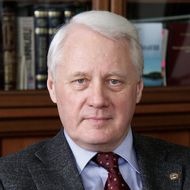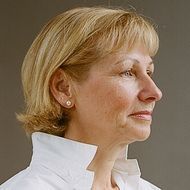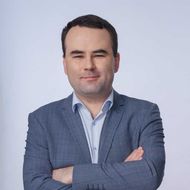‘The Goal of Modern Geography Is To Digitise Expert Knowledge and Integrate It with Big Data’
The importance of geographical science is increasing, as is the demand for education in this field. Since 2020, application numbers for Bachelor’s programmes at HSE University’s Faculty of Geography and Geoinformation Technology have climbed by 30%, while interest in Master’s programmes has also expanded, with applications up 10–15%. Nikolay Kurichev, Dean of the Faculty, spoke about this at a press conference hosted by MIA Rossiya Segodnya.
On August 15, 2025, a press conference on ‘The Geography of the New Generation: Strategic Prospects’ was held at the MIA Rossiya Segodnya press centre. The event was timed to coincide with Geographers’ Day, a professional holiday celebrated in Russia on August 18.
The event was attended by Nikolay Kasimov, First Vice-President of the Russian Geographical Society, President of the Geography Faculty at Lomonosov Moscow State University, and academician of the Russian Academy of Sciences, Olga Solomina, Director of the Institute of Geography of the Russian Academy of Sciences, Head of the Joint Department at the Faculty of Geography and Geoinformation Technology of HSE University and corresponding member of the Russian Academy of Sciences, and Nikolay Kurichev, Dean of the Faculty of Geography and Geoinformation Technology at HSE University. The participants discussed how modern geography is being transformed, and what challenges and opportunities the industry is facing in the context of digitalisation, the development of artificial intelligence, and climate change.
Nikolay Kasimov welcomed the audience and congratulated his colleagues on Geographers’ Day. He emphasised the significance of this holiday for the global community and discussed the environmental challenges of geography, particularly urban pollution.

President of the Geography Faculty at Lomonosov Moscow State University
‘The most important thing to solve environmental problems is measurement, more measurement, and even more measurement. We need to delve deeper into the microcosm to accurately identify pollutants and their range.’
He also referred to statistics from studies on road dust in Moscow, which is one of the major sources of pollution, especially in spring.
Olga Solomina discussed modern research tools such as remote sensing, mathematical modelling, and big data analysis.

Academic Supervisor of the Faculty of Geography and Geoinformation Technology
‘Today, cartography has evolved beyond simply being a map on paper. Now it includes the use of streaming data, three-dimensional images, as well as highly detailed and accurate measurements of objects in motion and space. These new technologies distinguish modern geography from the past. Nowadays, we have access to new tools like space imagery, drones, thermal imagers, and multispectral imaging to aid in studying our natural and social environments.’
Olga Solomina noted that climate change is one of the main challenges for modern geographers. She paid special attention to the study of glaciers, which are rapidly shrinking, as well as the effects of melting permafrost on the landscape transformation.
Nikolay Kurichev, in his speech, emphasised the practical significance of geographical science and its role in addressing pressing issues. Dean of HSE University’s Faculty of Geography discussed topics such as assessing natural and climate risks, selecting effective adaptation measures, developing digital solutions for environmental and climate projects, and managing territories using big data. All of these areas of research are conducted at HSE University’s Faculty of Geography and Geoinformation Technology.

Dean of the Faculty of Geography and Geoinformation Technology
‘There has been a revolution in the field of remote sensing worldwide. Using remote sensing technologies, we can create tools for automatic data analysis and geoanalytics, allowing us to make informed decisions. However, such decisions cannot be based solely on technical grounds—profound expertise is essential. The goal of modern geography is to translate this expert knowledge into a digital format and integrate it with big data through AI-powered geographic tools. Such solutions are essential for businesses, governments, and society as a whole.’
Nikolay Kurichev shared the success of HSE University’s Faculty of Geography in its 2025 admission campaign. Interest in the discipline grew significantly, with applications to the Bachelor’s programme rising by 30% and the passing score jumping by 20 points compared to previous years. As for the Master’s programme, the number of applications for the ‘Low Carbon Development’ and ‘Spatial Data and Applied Geoanalytics’ programmes also experienced growth, with application numbers up by 10–15%.
See also:
Mathematician from HSE University–Nizhny Novgorod Solves Equation Considered Unsolvable in Quadratures Since 19th Century
Mathematician Ivan Remizov from HSE University–Nizhny Novgorod and the Institute for Information Transmission Problems of the Russian Academy of Sciences has made a conceptual breakthrough in the theory of differential equations. He has derived a universal formula for solving problems that had been considered unsolvable in quadratures for more than 190 years. This result fundamentally reshapes one of the oldest areas of mathematics and has potential to have important implications for fundamental physics and economics. The paper has been published in Vladikavkaz Mathematical Journal.
HSE AI Research Centre Simplifies Particle Physics Experiments
Scientists at the HSE AI Research Centre have developed a novel approach to determining robustness in deep learning models. Their method works eight times faster than an exhaustive model search and significantly reduces the need for manual verification. It can be applied to particle physics problems using neural networks of various architectures. The study has been published in IEEE Access.
Scientists Show That Peer Influence Can Be as Effective as Expert Advice
Eating habits can be shaped not only by the authority of medical experts but also through ordinary conversations among friends. Researchers at HSE University have shown that advice from peers to reduce sugar consumption is just as effective as advice from experts. The study's findings have been published in Frontiers in Nutrition.
HSE University Establishes Cybersecurity Department
The HSE University Moscow Tikhonov Institute of Electronics and Mathematics (MIEM) has established a new Department of Cybersecurity. This move consolidates MIEM’s educational, scientific, and expert resources in information and computer security, expands its portfolio of educational programmes, strengthens partnerships with industry leaders, and enhances HSE’s position as a leading centre of cybersecurity competence.
HSE University to Host Second ‘Genetics and the Heart’ Congress
HSE University, the National Research League of Cardiac Genetics, and the Central State Medical Academy of the Administrative Directorate of the President will hold the Second ‘Genetics and the Heart’ Congress with international participation. The event will take place on February 7–8, 2026, at the HSE University Cultural Centre.
HSE University Develops Tool for Assessing Text Complexity in Low-Resource Languages
Researchers at the HSE Centre for Language and Brain have developed a tool for assessing text complexity in low-resource languages. The first version supports several of Russia’s minority languages, including Adyghe, Bashkir, Buryat, Tatar, Ossetian, and Udmurt. This is the first tool of its kind designed specifically for these languages, taking into account their unique morphological and lexical features.
HSE Scientists Uncover How Authoritativeness Shapes Trust
Researchers at the HSE Institute for Cognitive Neuroscience have studied how the brain responds to audio deepfakes—realistic fake speech recordings created using AI. The study shows that people tend to trust the current opinion of an authoritative speaker even when new statements contradict the speaker’s previous position. This effect also occurs when the statement conflicts with the listener’s internal attitudes. The research has been published in the journal NeuroImage.
Language Mapping in the Operating Room: HSE Neurolinguists Assist Surgeons in Complex Brain Surgery
Researchers from the HSE Center for Language and Brain took part in brain surgery on a patient who had been seriously wounded in the SMO. A shell fragment approximately five centimetres long entered through the eye socket, penetrated the cranial cavity, and became lodged in the brain, piercing the temporal lobe responsible for language. Surgeons at the Burdenko Main Military Clinical Hospital removed the foreign object while the patient remained conscious. During the operation, neurolinguists conducted language tests to ensure that language function was preserved.
HSE MIEM and AlphaCHIP Innovation Centre Sign Cooperation Agreement
The key objectives of the partnership include joint projects in microelectronics and the involvement of company specialists in supervising the research activities of undergraduate and postgraduate students. Plans also focus on the preparation of joint academic publications, the organisation of industrial placements and student internships, and professional development programmes for the company’s specialists.
HSE University and InfoWatch Group Sign Cooperation Agreement
HSE University and the InfoWatch Group of Companies marked the start of a new stage in their collaboration with the signing of a new agreement. The partnership aims to develop educational programmes and strengthen the practical training of specialists for the digital economy. The parties will cooperate in developing and reviewing curricula, and experts from InfoWatch will be involved in teaching and mentoring IT and information security specialists at HSE University.


